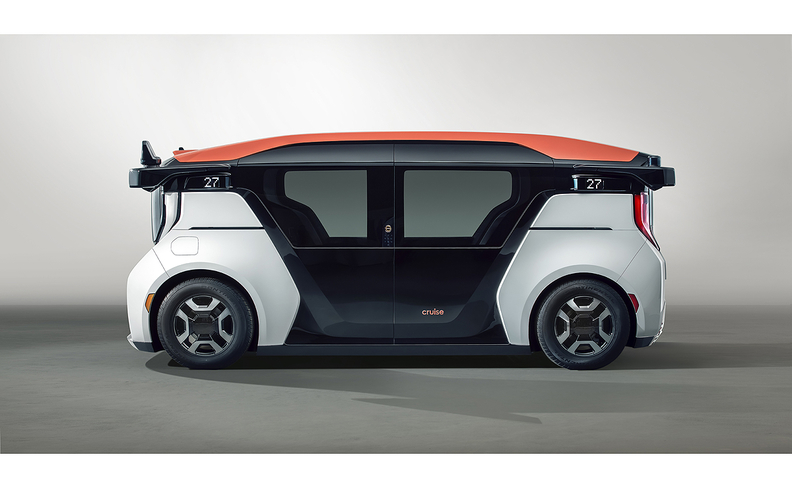This is the monthly edition of the Transport Workers Union’s Transportation Technology Newsletter. We aim to inform and educate our members, the labor movement, the public and policymakers about developments in transportation technology – and what the TWU is doing to ensure that new technology doesn’t undermine safety or harm the livelihoods of hard-working blue-collar workers. For suggestions and questions, please email ewytkind@gmail.com or adaugherty@twu.org.
ITEM OF THE MONTH
SHUTTING DOWN SHOP: General Motors’ Cruise self-driving subsidiary decided to mothball its planned Origin robotaxi vehicle – opting to replace a vehicle that would not have included features like a steering wheel, brake pedals and mirrors with a next-generation Chevy Bolt that is capable of being driven by humans.
The move is the latest example of the regulatory risk of robotaxis being too high, and another example that true self-driving technology isn’t ready for primetime. Reuters reports that General Motors is opting to use a conventional vehicle as the basis for its robotaxi operations because the move will not require the permission of U.S. regulators at the National Highway Traffic Safety Administration.
“GM finally decided that pursuing a driverless minibus vehicle would be harmful to their bottom line,” said TWU Administrative Vice President Curtis Tate. “Origin’s failure to launch is yet another example of self-driving technology that is not ready for the roads – and the importance of human operators on board any taxi or transit vehicle of any size.”
Ousted Cruise CEO Kyle Vogt, who resigned after a pedestrian in San Francisco was dragged 20 feet by a Cruise robotaxi after being struck by another vehicle, whined on X about the Origin move. He claimed GM “fumbles the ball, shuts things down, and loses the lead” on autonomous vehicles.
“GM’s decision to mothball the Origin should serve as a warning for arrogant, wealthy tech moguls who think they alone can force autonomous transportation onto America’s city streets,” said TWU International President John Samuelsen. “Technology can be used to make travel safer but it cannot replace the intrinsic value of humans behind the wheel, as GM’s latest move illustrates.”
But even as Cruise is barred from operating in California, the company is expanding testing operations in Dallas, Houston and Phoenix according to the New York Times. The testing step is a prelude to the company offering paid rides for customers in those cities, potentially endangering the public like it has in the Bay Area.
WHAT ELSE IS COOKING
Note to German Transport Officials: Beware Those Zombie Robotaxis: German rail operator Deutsche Bahn will pilot a driverless on-demand shuttle deploying six vehicles in its public transportation system with safety drivers on-board initially.
“German transportation officials be warned, take a close look at the debacle we have seen on our roads in the US with zombie robotaxis that regularly crash,” cautioned TWU International President John Samuelsen. “This autonomous vehicle technology has proven disastrous on complex road systems, snarling traffic, disrupting first responders and threatening safety.”
Alphabet Pours Billions More into Waymo Driverless Unit: Google parent company, Alphabet, keeps betting big that Americans will adapt to driverless vehicles even though its Waymo vehicles crash and have faced federal investigations. Alphabet’s “Other Bets” division, which is bankrolling Waymo, saw losses exceed $1 billion as the company attempts to persuade Americans to travel in robocars that crash with frequency.
BAD FOR THE PLANET: Autonomous tech isn’t just bad for safety – it also contributes to higher carbon emissions. Bloomberg reports that Google’s emissions climbed by 48% over the last five years as it integrates AI with its various tech platforms. AI tech is a major component of many autonomous driving systems.
Bloomberg adds that Google’s spike in emissions will make it harder for the company to meet its publicly stated goal of eliminating carbon emissions by 2030.
TECH GOES INTERNATIONAL: TWU Administrative Vice President Curtis Tate recently sat down for an interview with Radio Free Asia about the TWU’s organizing efforts on automation as part of a story on issues with robotaxis in China. Tate said the TWU spent years researching and organizing on the issue of automation and ultimately secured contract language in Columbus, Ohio that effectively bars the Central Ohio Transportation Authority from introducing autonomous technology unless the TWU agrees to it.
“Our position is that we are not opposed to technology itself, but we don’t want it to weaken our power. People’s concerns can be addressed in a variety of ways, such as through legislation.” said Tate.
SHUTTLING AROUND: Two driverless shuttles are coming to JFK International Airport in New York, Gothamist reports. The shuttles will operate in the airport’s parking lots and not on public roads. For now, the shuttles will have on-board safety attendants and the Port Authority says the agency will not reduce Bus Operators.
“We are closely monitoring developments like the new shuttles at JFK,” said Tate, who wrote an op-ed in the New York Daily News arguing that autonomous vehicles on NYC streets will turn the public into crash-test dummies. “New technology should enhance safety, not replace Bus Operators.”
WHAT WE’RE READING:
Autonomous On-Demand Service in Minnesota Transit System. CBS News.
US road safety agency will look into fatal crash near Seattle involving Tesla using automated system. Associated Press.

